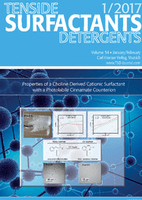
TENSIDE SURFACTANTS DETERGENTS
Scope & Guideline
Advancing Research in Chemical Engineering and Physics
Introduction
Aims and Scopes
- Surfactant Chemistry and Synthesis:
Explores the chemical synthesis of various surfactants, including ionic, nonionic, cationic, and amphoteric types, with a focus on their molecular structures and functional properties. - Applications in Cleaning and Detergency:
Investigates the effectiveness of surfactants in cleaning applications, including household and industrial detergents, with an emphasis on performance metrics and consumer behavior. - Environmental and Ecological Impact:
Studies the biodegradability, eco-friendliness, and sustainability of surfactants, particularly biosurfactants, to understand their impact on the environment. - Physicochemical Properties and Interactions:
Analyzes the physicochemical properties of surfactants, including their aggregation behavior, surface activity, and interactions with other substances. - Advanced Characterization Techniques:
Utilizes various characterization methods such as spectroscopy, rheology, and micellization studies to elucidate surfactant behavior and performance in different formulations.
Trending and Emerging
- Biosurfactants and Green Chemistry:
A significant increase in research on biosurfactants, highlighting their ecological benefits and potential applications in sustainable practices, reflects a growing trend towards green chemistry. - Artificial Intelligence and Machine Learning Applications:
Emerging studies on the use of AI and machine learning to predict surfactant behaviors and optimize formulations suggest a trend towards integrating technology with surfactant research. - Advanced Characterization Techniques:
There is a rising interest in sophisticated characterization methods, such as dynamic light scattering and rheology, to better understand surfactant interactions and properties. - Consumer Behavior Studies:
Research exploring consumer attitudes towards detergents and cleaning products is increasing, indicating a trend towards understanding market dynamics and consumer preferences. - Nanotechnology in Surfactant Applications:
The use of nanotechnology in developing advanced surfactant formulations, particularly for enhanced cleaning and delivery systems, is gaining traction in recent publications.
Declining or Waning
- Traditional Synthetic Surfactants:
There is a noticeable reduction in studies focused solely on traditional synthetic surfactants, as the field shifts towards more sustainable and eco-friendly alternatives like biosurfactants. - Single-Component Systems:
Research on single-component surfactant systems is declining, with an increasing focus on complex formulations and mixtures that better mimic real-world applications. - Basic Surfactant Properties:
The exploration of fundamental properties of surfactants, such as basic surface tension measurements, is becoming less frequent, possibly due to a shift towards more applied and innovative studies. - Non-Functional Applications:
There is a decreasing interest in non-functional applications of surfactants, as the focus is shifting towards specific functional roles in industries like pharmaceuticals and food technology.
Similar Journals
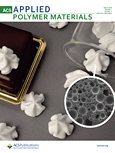
ACS Applied Polymer Materials
Pioneering Insights in Applied Polymer MaterialsACS Applied Polymer Materials is a prestigious journal published by the American Chemical Society, specifically tailored for the dynamic fields of Organic Chemistry, Polymers and Plastics, and Process Chemistry and Technology. With its ISSN 2637-6105, the journal has rapidly established itself within the academic community, achieving a distinguished Q1 quartile ranking across multiple categories in 2023. This places it among the top-tier journals globally, reinforcing its critical role in disseminating groundbreaking research and innovation in polymer science. The journal is known for its rigorous peer-review process and publishes high-quality articles that are pivotal for researchers, professionals, and students eager to advance knowledge in polymer materials and their applications. Positioned to cover converging themes from 2019 through 2024, ACS Applied Polymer Materials embraces a wide scope of studies, from fundamental chemistry to practical engineering applications, thereby fostering significant advancements in material science. While it offers traditional access options, the journal's impact is reflected in its impressive rankings within Scopus, indicating its relevance and influence in the chemical engineering domain. Join the global community of innovators and discover the latest insights that continue to shape the landscape of applied polymer research.

JOURNAL OF THE CHILEAN CHEMICAL SOCIETY
Elevating Chemical Research with Open Access Insights.The Journal of the Chilean Chemical Society, published by the Sociedad Chilena de Química, serves as a premier platform for disseminating significant research findings in the field of Chemistry. With an ISSN of 0717-9707, this journal has established its presence since 2003, providing open access to a diverse range of studies and advancements in this vital scientific domain. It currently holds a Q3 category ranking in Chemistry (miscellaneous) and ranks 196 out of 408 in the general chemistry category on Scopus, indicating its valuable contributions to the field. Through the journal, researchers, professionals, and students are encouraged to engage with cutting-edge research and foster collaboration among the scientific community in Chile and beyond. The society's commitment to excellence ensures that articles published reflect high-quality research, underpinning the journal’s role in shaping knowledge and innovation in chemistry.
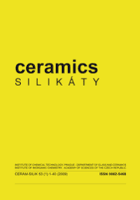
CERAMICS-SILIKATY
Unveiling New Horizons in Ceramic ApplicationsCERAMICS-SILIKATY is a distinguished open-access journal published by the University of Chemistry and Technology, Prague, specializing in the fields of Ceramics and Composites, Analytical Chemistry, Chemical Engineering, and Materials Chemistry. Since its inception in 1991, this journal has played a pivotal role in disseminating cutting-edge research and innovative findings in the study of ceramics, emphasizing both fundamental and applied aspects. With a commitment to accessibility since 2000, CERAMICS-SILIKATY promotes knowledge sharing among researchers, professionals, and students globally. The journal's current standing in the Q3 Quartile across several categories highlights its significant contributions and relevance in the academic community. As a hub for interdisciplinary research, the journal invites submissions that advanced our understanding of ceramic materials and their applications, positioning itself as an essential resource for those engaged in the forefront of materials science.

CHEMISTRY OF NATURAL COMPOUNDS
Decoding Nature’s Chemistry for a Sustainable FutureChemistry of Natural Compounds is a premier academic journal dedicated to the intersection of natural products and modern chemistry, published by Springer. Since its inception in 1965, this journal has published innovative research articles, reviews, and discussions that focus on the chemistry and biochemistry of natural compounds, with an emphasis on their applications in various fields including medicine, agriculture, and environmental science. Recognized for its contributions to the scientific community, the journal is indexed in key databases and holds a respectable impact factor that underscores its relevance in the academic landscape. Currently ranked in the Q3 category across multiple disciplines, including Biochemistry, Genetics and Molecular Biology, Chemistry, and Plant Science, it serves as a critical resource for researchers and professionals aiming to deepen their understanding of the complex interactions between natural compounds and biological systems. While not an open-access journal, Chemistry of Natural Compounds provides valuable insights and essential findings that can aid in advancing both theoretical and applied sciences for researchers, students, and industry practitioners alike.
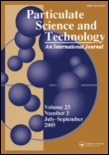
PARTICULATE SCIENCE AND TECHNOLOGY
Transforming Understanding of Chemical EngineeringParticulate Science and Technology is a distinguished journal published by Taylor & Francis Inc, dedicated to advancing the understanding and application of particulate materials across various scientific fields. Serving the international community since 1983, this journal features original research, reviews, and technical notes that address key developments in chemical engineering, particularly focusing on the generation, processing, and application of particulate matter. With an impact factor that reflects its significant contributions within the discipline (Ranked Q2 in Chemical Engineering), the journal provides a vital platform for researchers, professionals, and students seeking to enhance their knowledge and influence in the field. While not currently open access, Particulate Science and Technology is committed to disseminating high-quality research that stimulates innovation and fosters collaboration amongst experts worldwide. For those invested in the advancement of chemical engineering principles, this journal is an invaluable resource.
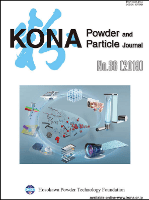
KONA Powder and Particle Journal
Advancing powder technology for a brighter tomorrow.KONA Powder and Particle Journal, published by the HOSOKAWA POWDER TECHNOL FOUNDATION since 1983, is a leading open-access journal dedicated to advancing research in the fields of powder technology and particle science. Situated in Japan, this journal serves as a vital platform for researchers, professionals, and students, offering a wealth of knowledge on various applications and innovations in Chemical Engineering, Chemistry, Engineering, and Materials Science. With an impressive Q2 ranking across multiple categories in 2023 and notable Scopus rankings that position it among the top journals in its field, KONA fosters collaboration and discovery by providing immediate and unrestricted access to groundbreaking research. The journal not only promotes the dissemination of high-quality articles but also emphasizes the practical implications of powder and particle technology in real-world applications, making it an essential resource for advancing scientific knowledge and industrial practices.

C-Journal of Carbon Research
Leading the Charge in Carbon Innovations and Environmental SolutionsC-Journal of Carbon Research is an innovative and dynamic journal published by MDPI, situated in the picturesque city of Basel, Switzerland. Launched in 2015 and operating under an Open Access model, the journal aims to promote the dissemination of high-quality research related to carbon science, environmental sustainability, and renewable resources. With a current impact factor reflecting its growing influence in the field, the journal's standing is bolstered by its Scopus ranking, placing it in the 37th percentile in the Environmental Science category. It offers a platform for researchers, professionals, and students alike to engage with cutting-edge studies, reviews, and discussions that contribute to environmental science advancements. As the journal continues its convergence journey from 2022 to 2024, it remains committed to fostering scholarly exchange and interdisciplinary collaboration on pressing carbon-related challenges.

Macroheterocycles
Fostering Global Collaboration in Chemistry DiscoveriesMacroheterocycles is a premier academic journal dedicated to the exploration and advancement of Analytical Chemistry and Organic Chemistry, published by the esteemed Ivanovo State University of Chemical Technology. Since its inception in 2008, this open-access journal has focused on providing a platform for innovative research and breakthrough discoveries in the field of heterocyclic compounds. With its current ranking in the Q3 quartile for Analytical Chemistry and Q4 quartile for Organic Chemistry, Macroheterocycles is rapidly establishing itself as a valuable resource for scientists, researchers, and students seeking to enrich their understanding of complex chemical structures and analytical techniques. Its comprehensive publication model ensures that the latest findings are accessible to a global audience, fostering collaboration and discourse in the scientific community. With ongoing contributions aimed at addressing contemporary challenges in chemistry, this journal is poised to make significant impacts in the field while encouraging the dissemination of knowledge within and beyond Russia.

Physicochemical Problems of Mineral Processing
Exploring Interdisciplinary Insights in Mineral ProcessingPhysicochemical Problems of Mineral Processing is a prestigious journal that serves as a vital resource in the fields of Economic Geology, Geology, Materials Chemistry, Physical and Theoretical Chemistry, and Process Chemistry and Technology. Published by OFICYNA WYDAWNICZA POLITECHNIKI WROCLAWSKIEJ in Poland, this journal has been a cornerstone of interdisciplinary research since its inception in 2008, with a commitment to advancing our understanding of mineral processing through innovative physicochemical methodologies. With a respectable Q3 category ranking across multiple disciplines and Scopus rankings that reflect its growing impact and relevance, the journal invites researchers, professionals, and students to explore cutting-edge studies, original articles, and case reports aimed at enhancing the mineral processing field. While the journal does not offer open access, it provides valuable insights and contributions to the global academic community, making it essential reading for those looking to push the boundaries of knowledge in this critical area.

ACTA POLYMERICA SINICA
Pioneering Insights in Polymers and PlasticsACTA POLYMERICA SINICA is a distinguished journal published by SCIENCE PRESS, specializing in the multifaceted disciplines of Chemical Engineering, Chemistry, and Polymers and Plastics. Established in 1996, this peer-reviewed journal provides a critical platform for the dissemination of cutting-edge research and advancements within these fields, promoting innovation and knowledge-sharing among researchers and professionals globally. With its presence in the highly competitive Q3 quartile rankings as of 2023, the journal demonstrates a commitment to maintaining rigorous academic standards while supporting the evolving landscape of polymer science. Operating from Beijing, China, the journal caters to a broad readership and emphasizes the importance of interdisciplinary collaboration in addressing contemporary challenges in material science. Although it does not offer open access, ACTA POLYMERICA SINICA remains a vital resource for scholars seeking to enhance their understanding and contribute valuable insights to the field.